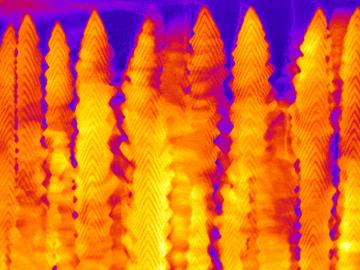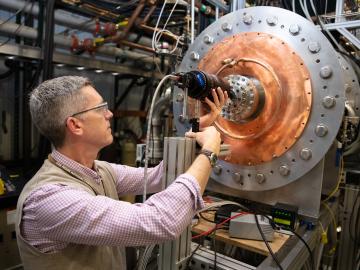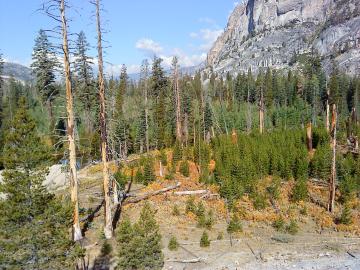
Filter News
Area of Research
- Advanced Manufacturing (1)
- Biology and Environment (14)
- Clean Energy (29)
- Climate and Environmental Systems (2)
- Computer Science (1)
- Fusion and Fission (5)
- Fusion Energy (6)
- Isotope Development and Production (1)
- Isotopes (4)
- Materials (33)
- Materials for Computing (3)
- National Security (6)
- Neutron Science (16)
- Nuclear Science and Technology (22)
- Nuclear Systems Modeling, Simulation and Validation (1)
- Supercomputing (22)
News Topics
- (-) Biomedical (21)
- (-) Composites (1)
- (-) Cybersecurity (4)
- (-) Environment (29)
- (-) Fusion (14)
- (-) Isotopes (8)
- (-) Materials Science (39)
- (-) Nuclear Energy (34)
- (-) Space Exploration (4)
- 3-D Printing/Advanced Manufacturing (29)
- Advanced Reactors (14)
- Artificial Intelligence (8)
- Big Data (11)
- Bioenergy (12)
- Biology (5)
- Biotechnology (2)
- Buildings (1)
- Chemical Sciences (5)
- Clean Water (2)
- Climate Change (10)
- Computer Science (39)
- Coronavirus (23)
- Critical Materials (3)
- Decarbonization (1)
- Energy Storage (21)
- Exascale Computing (3)
- Frontier (1)
- Grid (7)
- High-Performance Computing (3)
- Machine Learning (8)
- Materials (2)
- Mathematics (2)
- Mercury (1)
- Microscopy (8)
- Molten Salt (2)
- Nanotechnology (17)
- National Security (2)
- Neutron Science (30)
- Physics (13)
- Polymers (7)
- Quantum Science (14)
- Security (3)
- Summit (17)
- Sustainable Energy (24)
- Transformational Challenge Reactor (5)
- Transportation (15)
Media Contacts

In the search to create materials that can withstand extreme radiation, Yanwen Zhang, a researcher at the Department of Energy’s Oak Ridge National Laboratory, says that materials scientists must think outside the box.

The Department of Energy’s Office of Science has selected three Oak Ridge National Laboratory scientists for Early Career Research Program awards.

Bruce Wilson, a group leader in the Environmental Sciences Division at the Department of Energy’s Oak Ridge National Laboratory, has been elevated to the grade of senior member of the Association for Computing Machinery

Juergen Rapp, a distinguished R&D staff scientist in ORNL’s Fusion Energy Division in the Nuclear Science and Engineering Directorate, has been named a fellow of the American Nuclear Society

Giri Prakash, data informatics scientist and director of the Department of Energy’s Atmospheric Radiation Measurement Data Center at Oak Ridge National Laboratory, has accepted an invitation from the National Academies of Sciences, Engineering, and Medicine to serve a four-year term on the U.S. National Committee for CODATA.

A team led by the Department of Energy’s Oak Ridge National Laboratory synthesized a tiny structure with high surface area and discovered how its unique architecture drives ions across interfaces to transport energy or information.

Temperatures hotter than the center of the sun. Magnetic fields hundreds of thousands of times stronger than the earth’s. Neutrons energetic enough to change the structure of a material entirely.

A multi-institutional research team found that changing environmental conditions are affecting forests around the globe, leading to increasing tree death and uncertainty about the ability of forests to recover.

ITER, the world’s largest international scientific collaboration, is beginning assembly of the fusion reactor tokamak that will include 12 different essential hardware systems provided by US ITER, which is managed by Oak Ridge National Laboratory.

Oak Ridge National Laboratory researchers have discovered a better way to separate actinium-227, a rare isotope essential for an FDA-approved cancer treatment.


